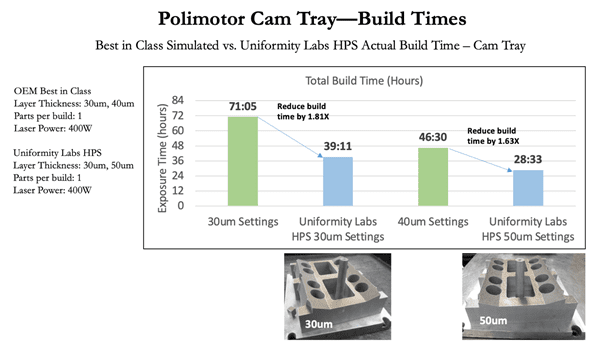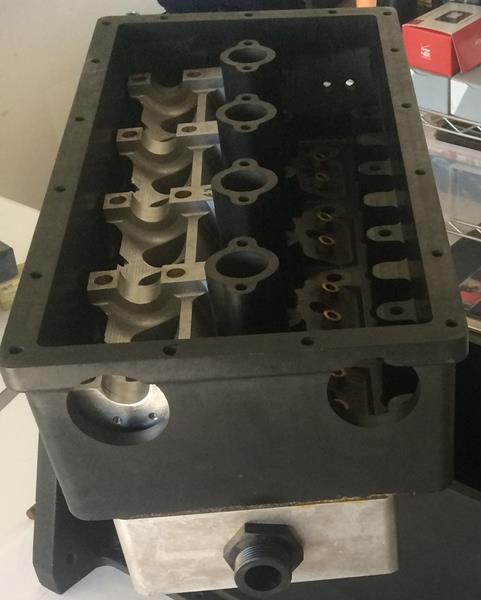Uniformity Labs, a producer of engineered materials for advanced manufacturing, has partnered with revolutionary race car engine developer, Polimotor, and Incodema3D, a leader in direct metal 3D printing, to produce a Cam Tray engine component designed by Polimotor.
More from the News
The Cam Tray component and associated CAD files were provided by Matti Holtzberg, founder of Polimotor, for a joint case study with Incodema3D to evaluate the throughput benefits of Uniformity powders and print parameters for this component. Incodema3D’s EOS M290 was used to build the Cam Trays using Uniformity Labs’ ultra-low porosity AlSi10Mg powder and optimized build parameters.
Incodema3D printed two halves of the Cam Tray at 30um and 50um layers to validate the simulated build times and demonstrate the increased throughput advantages of Uniformity Labs’ powders and parameters without compromising material properties.
Uniformity executed build times simulations using Uniformity HPS settings at 30um & 50um to compare with EOS 30um & 40um standard settings:
- Uniformity As-printed densities are 99.9% compared to EOS ≥99.8%
- Uniformity mechanical properties at 30um are superior to best-in-class 30um, and at 50um are comparable to best-in-class 40um
- Uniformity achieves less than 4um Ra on as-printed vertical surfaces at 30um layer thickness and slightly higher values at 50um layer thickness
- At the same 30um layers, Incodema3D demonstrated a 181% improvement in throughput vs. EOS conventional powder and parameters with no compromise to material properties, delivering a density of 99.9%+ at the top of the chain
- At 50um layers, Incodema3D demonstrated a 163% improvement in throughput vs. EOS conventional 40um build time with no compromise to material properties, delivering an average density of 99.85%

“This is a strategically important case study because it shows the significant advantages of using our engineered materials for advanced manufacturing of critical components for use in the transportation industry,” said Uniformity founder and CEO Adam Hopkins. “The results show that we can achieve faster, more cost-effective part production without compromising material properties.”
“Since we created the world’s first super light-weight polymer engine in 1980, manufacturing technologies have advanced to allow us to include 3D printed metal components along with the polymer components in the engine design,” said Polimotor founder and innovator Matti Holtzberg. “The case study we just completed on the engine Cam Tray, with Uniformity’s advanced aluminum alloy powder and print parameters, produced at Incodema3D, shows substantial benefits in manufacturing time, which will have a significant impact on reducing the cost to make these and other components for our engine.”
“Along with the inherent benefits 3D printing provides in reducing weight and optimizing designs, the ability to reduce cost without compromise to material properties has significant implications not just for producing racing engines but for the global auto industry, which faces a growing demand for lighter, more fuel-efficient cars,” Holtzberg continued.
About Uniformity Labs
Uniformity Labs develops breakthrough material and software solutions to accelerate and expand global commercial/industrial 3D printing (AM) markets. Its patented technology uniquely enables fully dense printing with minimal shrinkage of binder jetting materials, delivering significant cost savings, speed, and quality improvements across all mainstream AM printers. Uniformity’s feedstock materials and print processes dramatically impact the AM value chain by increasing the reliability and efficiency of printing.
Subscribe to AM Chronicle Newsletter to stay connected: https://bit.ly/3fBZ1mP
Follow us on LinkedIn: https://bit.ly/3IjhrFq
Visit for more interesting content on additive manufacturing: https://amchronicle.com/


